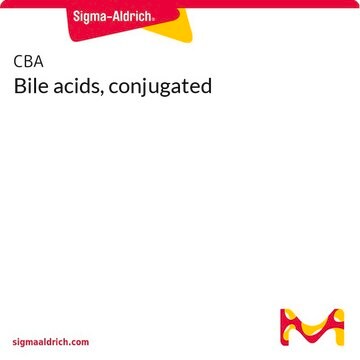C4650
Cholestyramine resin
Sinónimos:
Colestyramine, Dowex 1X2 Cl--Form
Iniciar sesiónpara Ver la Fijación de precios por contrato y de la organización
About This Item
Productos recomendados
form
powder
Quality Level
technique(s)
activity assay: suitable
matrix
polystyrene/divinylbenzene
pH
4—6
capacity
~1.0 meq/g(dry)
Application
Cholestyramine resin has been used:
- as a diet supplement to study the bile acid pool size and fecal bile acid output in mice
- to alter the bile acid (BA) levels and study its effect on liver fibrosis development in wild type (WT), fibroblast growth factor 15 (Fgf15)−/−, and Fgf15 transgenic (TG) mice
- in in vitro digestion process to study the capacity of the fractions for binding bile acid (BA)
Cholestyramine resin is used in protein chromatography, ion exchange chromatography and anion exchange media. Cholestyramine has been used to study the relief of postcholecystectomy diarrhea, the management of intractable cholestatic pruritus and obesity.
Biochem/physiol Actions
Cholestyramine is a cationic exchange resin polymer. This resin is a bile acid sequestrant that interchanges chloride anions for bile acids of the small intestine lumen, leading to excretion of bile acids in the feces and reduced levels of serum bile acid. Cholestyramine is used to treat primary hypercholesterolemia. The resin induces dose-dependent reduction of low-density lipid (LDL) cholesterol. It ameliorates the risk of coronary artery disease.
Other Notes
Quartenary ammonium functional groups attached to cross-linked polystyrene
Legal Information
Storage Class
11 - Combustible Solids
wgk_germany
WGK 2
flash_point_f
Not applicable
flash_point_c
Not applicable
ppe
Eyeshields, Gloves, type N95 (US)
Elija entre una de las versiones más recientes:
¿Ya tiene este producto?
Encuentre la documentación para los productos que ha comprado recientemente en la Biblioteca de documentos.
Los clientes también vieron
A R Bolier et al.
Acta gastro-enterologica Belgica, 75(4), 399-404 (2013-02-14)
Pruritus can be the dominant symptom of cholestatic liver disease but is difficult to treat since unraveling its pathophysiology is a great challenge. Serum autotaxin activity correlates with pruritus intensity, but its causal relationship, expression pattern and exact mode of
Guodong Li et al.
American journal of physiology. Gastrointestinal and liver physiology, 305(11), G829-G837 (2013-10-05)
Farnesoid X receptor (FXR, Nr1h4) is a ligand-activated transcription factor belonging to the nuclear receptor superfamily. FXR is essential in maintaining bile acid (BA) homeostasis, and FXR(-/-) mice develop cholestasis, inflammation, and spontaneous liver tumors. The signal transducer and activator
Guillermo Rodríguez-Gutiérrez et al.
Journal of agricultural and food chemistry, 62(36), 8973-8981 (2014-08-21)
A process based on a steam explosion pretreatment and alkali solution post-treatment was applied to fractionate olive stones (whole and fragmented, without seeds) and olive cake into their main constitutive polymers of cellulose (C), hemicelluloses (H), and lignin (L) under
Robert W Crawford et al.
PLoS pathogens, 8(9), e1002918-e1002918 (2012-10-03)
Intestinal inflammation changes the luminal habitat for microbes through mechanisms that have not been fully resolved. We noticed that the FepE regulator of very long O-antigen chain assembly in the enteric pathogen Salmonella enterica serotype Typhimurium (S. Typhimurium) conferred a
Märta K Borghede et al.
European journal of internal medicine, 22(6), e137-e140 (2011-11-15)
The liver produces and secretes bile acids into the small intestine. In the small intestine, most of the bile acids are absorbed in the distal ileum with portal vein transportation back to the liver and resecretion (enterohepatic recycling). Increased spillover
Nuestro equipo de científicos tiene experiencia en todas las áreas de investigación: Ciencias de la vida, Ciencia de los materiales, Síntesis química, Cromatografía, Analítica y muchas otras.
Póngase en contacto con el Servicio técnico












